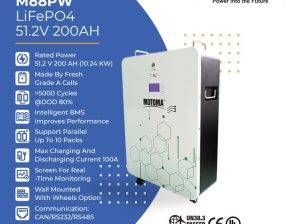The Real Risks Behind Lithium-Ion Batteries: What You Need To Know For Safety
Technology advances have made our lives much easier, but there are still risks associated with everyday items that we rely on, like lithium-ion batteries. In this blog post, we’ll explore the real risks behind lithium-ion batteries: what causes them to catch fire or explode and what you need to know to keep yourself safe. Read on to find out more!
Introduction to Lithium Ion Batteries
Lithium-ion batteries are one of the most popular batteries on the market today, powering everything from cell phones to laptops. But concerns have been raised about their safety, particularly in light of high-profile incidents involving fires and explosions.
So what are the real risks associated with lithium-ion batteries? And what can you do to reduce the chances of an incident occurring?
Here’s a look at the key things you need to know:
- Lithium-ion batteries can overheat and catch fire if they’re damaged or defective.
This is perhaps the most well-known hazard associated with lithium-ion batteries. A battery can overheat and catch fire if it is damaged or defective. This can happen even if the battery isn’t being used.
There have been several high-profile incidents involving fires and explosions caused by faulty lithium-ion batteries, such as the infamous case of the Samsung Galaxy Note 7. In most cases, these incidents occur when the battery is damaged in some way – for example, if it’s punctured or crushed.
- Lithium-ion batteries can also be dangerous if they’re not used properly.
It’s important to remember that lithium-ion batteries are powerful devices that must be treated with care. For example, you should never try to disassemble a battery yourself – this can be extremely dangerous. And always follow the manufacturer’s instructions when using Lith.
Types of Lithium-Ion Batteries
There are many different lithium-ion batteries, each with advantages and disadvantages. The most common type of lithium-ion battery is the cylindrical cell, which is used in laptops, cell phones, and other portable electronic devices. These batteries are typically very lightweight and have a high energy density, making them ideal for portable devices. However, they also tend to be more expensive than other lithium-ion batteries.
Another common type of lithium-ion battery is the prismatic cell, which is often used in electric vehicles. These batteries are typically larger and heavier than cylindrical cells but have a lower energy density. This makes them less suitable for portable devices, but they are cheaper than cylindrical cells and can store more energy.
Lithium-ion batteries can also be found in many shapes and sizes, depending on their intended use. For example, button cells are small coin-shaped cells often used in watches and hearing aids. These batteries are very convenient because they can be easily replaced when they run out of power. However, button cells typically have a lower energy density than other lithium-ion batteries, so they are not as suitable for high-powered devices like laptops or cell phones.
Advantages and Disadvantages of Lithium Ion Batteries
There are many advantages and disadvantages to using lithium-ion batteries. On the plus side, they are much lighter and more powerful than other batteries, making them ideal for portable electronic devices. They also have a longer lifespan than most other batteries, meaning you won’t have to replace them as often.
On the downside, however, lithium-ion batteries can be dangerous if not used properly. They have been known to catch fire or explode if damaged, overcharged, or exposed to extreme heat or cold. If you are using devices containing lithium-ion batteries, it is essential to follow all safety instructions carefully to avoid accidents.
How do Lithium Ion Batteries Catch on Fire or Explosion?
There have been a handful of documented cases where lithium-ion batteries have spontaneously combusted or exploded. While the chances of this happening are meager, it’s still important to be aware of the potential risks.
There are a few different ways that lithium-ion batteries can catch on fire or explode. The most common way is through overcharging. When a battery is charged beyond its capacity, it can start to overheat and eventually catch fire.
Another way this can happen is if the battery is damaged. This could be from physical damage like being dropped or electrical damage like short-circuiting. If a battery is damaged, it can also overheat and catch fire.
Finally, there is the possibility of a manufacturing defect causing a battery to fail. This is relatively rare, but it has happened in a few cases. If there is a problem with how the battery is made, it could lead to a fire or explosion.
While the chances of these things happening are very low, it’s essential to be aware of the risks associated with lithium-ion batteries.
Safety Precautions for Using and Storing Lithium Ion Batteries
Regarding safety, lithium-ion batteries are no different than any other type of battery. There are some basic precautions that you should take when using and storing them.
First, always keep them in a cool, dry place. Heat and moisture can damage the batteries and cause them to leak or catch fire.
Second, never leave them in direct sunlight. The heat can damage the cells and cause a fire.
Third, never store them in a metal container. Metal can conduct electricity, and short Circuits may occur. Always use a plastic or rubber container to store your lithium-ion batteries.
Fourth, when you are not using the battery, always disconnect it from the charger. Leaving it connected can drain the battery and, over time, will shorten its life span.
Finally, Never throw Lithium Ion Batteries into a fire, as they may Explode! If you must dispose of them properly, please recycle them at your local recycling center that accepts Lithium Ion Batteries.
Testing: Are Lithium Ion Batteries Safe?
There are a lot of concerns about the safety of lithium-ion batteries, and rightfully so. These batteries are used in everything from cell phones to laptops to e-cigarettes, and several high-profile incidents have caused fires or explosions.
So what’s the real risk? Are lithium-ion batteries safe?
The short answer is that yes, lithium-ion batteries are safe. But there are some important caveats to keep in mind.
First, it’s essential to understand how these types of batteries work. Lithium-ion batteries are made up of two electrodes (a positive and a negative) separated by an electrolyte. When the battery is used, electrons flow through the electrolyte from the negative electrode to the positive electrode. This creates a current that powers whatever device the battery is powering.
But if something goes wrong with this process—if the electrodes come into contact with each other, for example—the resulting chemical reaction can create heat (and sometimes sparks or fire). That’s why it’s so important to use caution when handling lithium-ion batteries and never attempt to disassemble one yourself.
Second, even though lithium-ion batteries are generally safe, there have been some high-profile incidents where they’ve caused fires or explosions. Most of these incidents have been due to faulty manufacturing or incorrect usage (like overcharging a battery). So it’s essential to buy your batteries from a reputable source,
Alternatives to Lithium Ion Batteries
The demand for lithium-ion batteries has increased as the world increasingly relies on electronic devices. While these batteries are popular because they are small and lightweight, they can pose a serious safety risk if not properly used or maintained.
A few alternative battery technologies are available that may be safer than lithium-ion batteries. One option is a supercapacitor, which can store more energy than a lithium-ion battery and discharge it quickly. Supercapacitors also have a longer life span than lithium-ion batteries and can be recycled.
Another alternative is a lead acid battery, which is common in car batteries. Lead acid batteries are heavier than lithium-ion batteries but can be cheaper and easier to recycle. However, lead-acid batteries may not be as efficient in storing energy as lithium-ion batteries.
A third option is a nickel-metal hydride battery, similar to a lead acid battery but using different materials. Nickel-metal hydride batteries are more expensive than lead-acid batteries but may last longer and be more efficient in storing energy.
When choosing an alternative to a lithium-ion battery, it is important to consider the device’s specific needs. Some devices may require a specific type of battery, so it is important to consult the manufacturer before making a purchase.
Conclusion
Lithium-ion batteries are a common and reliable source of power for many devices. When used responsibly, the risk of fire or explosion is minimal. It is important to know how to properly store and use lithium-ion batteries to avoid any potential risks associated with them. By understanding the real risks behind lithium-ion batteries and following safety tips such as avoiding overcharging and never exposing them to extreme temperatures, consumers can enjoy their device’s full battery life while protecting themselves from any possible accidents.
Comments (1)
You must be logged in to post a comment.



[…] polymer batteries are another type of high drain battery. They are lighter and more flexible than lithium-ion batteries, making them ideal for use in portable devices. They are commonly used in smartphones, tablets, and […]